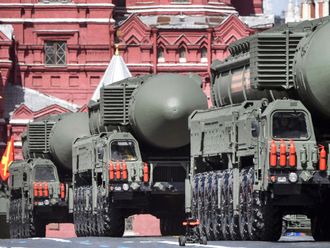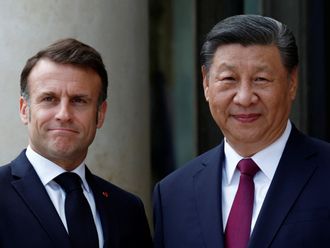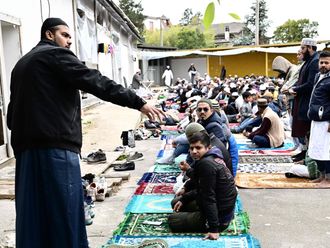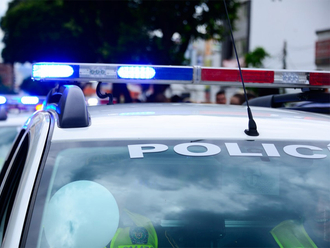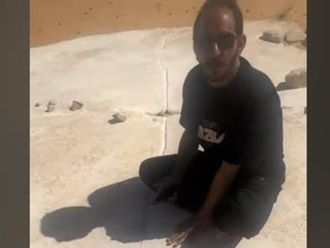Munich: German Chancellor Angela Merkel said on Saturday that she’s still unsure of reaching a deal to calm the crisis in Ukraine, which France’s president said could feature a broad demilitarised zone and greater autonomy for the separatist eastern region.
Merkel and French President Francois Hollande travelled to Kiev Thursday and Moscow on Friday in a bid to defuse growing violence in Ukraine. The two leaders plan to discuss the proposals in a phone call Sunday with Russian President Vladimir Putin and Ukrainian President Petro Poroshenko.
Hollande, speaking on France 2 television, said the plan under negotiation would see a 50- to 70-km demilitarised zone.
He called for “rather strong” autonomy in the east. “These people have gone to war,” Hollande said. “It will be difficult to make them share a common life.”
The negotiators’ aim is to draw up a possible joint document on implementing the much-violated September peace plan concluded in Minsk, Belarus. That agreement also featured a demilitarised zone, though the battle lines have since changed, and the government in Kiev has offered a measure of autonomy to the separatists.
“This conflict cannot be resolved by military means,” Merkel said at the Munich Security Conference. “It is all the more important now to set out substantial steps that serve to fill with life the Minsk agreement.”
Merkel said it is uncertain whether the talks will succeed, “but it is, from my point of view and that of the French president, in any case worth making this attempt.”
The urgent diplomacy comes as Western anxiety over the conflict grows and sanctions bite ever harder on Russia’s economy. More than 5,300 people have been killed since fighting began in April, according to a UN tally, and the bloodshed has markedly increased over the past two weeks.
Merkel acknowledged that experience of agreements being violated on the ground has been “disillusioning.”
Asked whether there are any guarantees a new agreement won’t suffer the same fate, she replied that “there are no theoretical guarantees.”
“After such experiences, I am very cautious with guarantees,” she said. “The guarantee can only be keeping to what has been agreed ... but the answer can’t be not to make any more agreements. Of course we have to try again and again, at least I think so.”
Russian Foreign Minister Sergei Lavrov said he “sincerely” hopes the latest diplomatic drive “will produce results, and those results will be supported by the parties to this conflict.”
As soon as Kiev and eastern Ukrainian separatists agree on practical details of implementing the Minsk deal, “I am sure that Russia will be among those parties that will guarantee the implementation of this agreement,” Lavrov told the conference. “But you can only guarantee what has already been achieved.”
The United States and other Western countries contend Russia has supplied troops and equipment to the separatists in eastern Ukraine who have been fighting Ukrainian government forces since April. Russia denies the claims.
The resurgent fighting has prompted the US to consider giving lethal weapons to Ukraine, an option opposed by European nations which fear the move would merely make the situation worse.
“The problem is that I cannot imagine any situation in which improved equipment for the Ukrainian army leads to President Putin being so impressed that he believes he will lose militarily,” Merkel said. “I have to put it that bluntly.”
Lavrov denounced “growing appeals in the West to ... pump Ukraine full with lethal weapons and to involve it in Nato.” He said that “this position will only exacerbate the tragedy of Ukraine.”
Nato Secretary General Jens Stoltenberg noted that the alliance itself has no weapons” any decision to send arms to Kiev is a matter for its member countries.
“There is a discussion going on among Nato allies now,” he said. “That’s part of being an alliance of open democratic societies.”
Merkel held a three-way meeting with Poroshenko and US. Vice-President Joe Biden after her appearance at the conference.
US. Secretary of State John Kerry also was in Munich for the annual gathering of foreign and security policy leaders.


